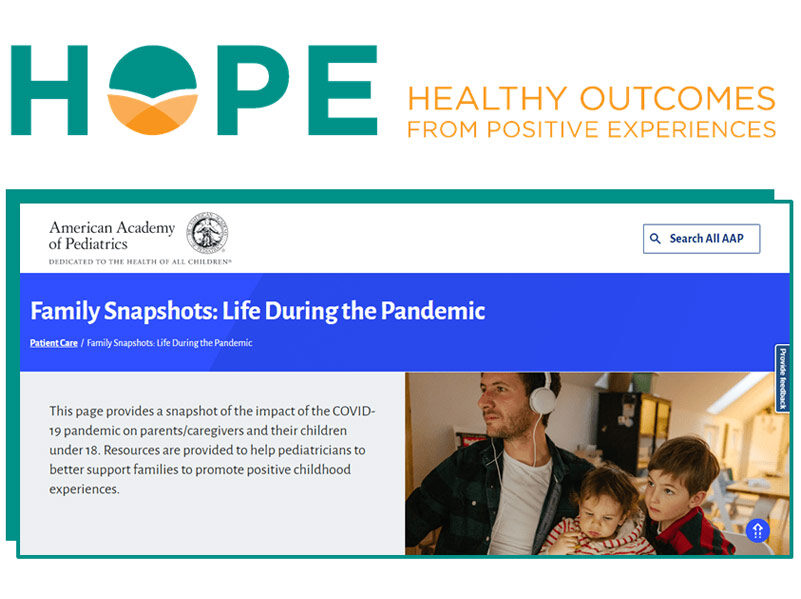
The American Academy of Pediatrics released two new snapshots in the Family Snapshots: Life during the Pandemic series. These reports share what parents found the most helpful or most challenging in raising their children throughout lockdown and as the pandemic progressed. In the Words of Parents Part 1: Work and Family Finances and In the Words of Parents Part 2: Remote Education and Home life.
In this two-part report, statements are summarized from 250 parents, who were randomly selected from the nine-thousand surveyed. This survey was conducted by the HOPE National Resource Center, in collaboration with the American Academy of Pediatrics, Prevent Child Abuse America, and the CDC (Centers for Disease Control and Prevention), and distributed with yougov.com. The survey asked parents about their experiences with their children during the COVID-19 pandemic at three different time points.
The pandemic disrupted family life. Previous Family Snapshots have described how parents have coped, finding new ways to spend time together, to feel safe, and to engage with others. The two snapshots posted by the AAP show how families adapted to challenges and continued to provide their children with positive childhood experiences. Parents discussed the home environment – both economic changes and support – and working and caring for their children from home.
Prior blogs have commented on the importance of concrete supports; and this blog features comments from a frontline worker who was grateful for the continued availability of child care. They also addressed their engagement with the school when they wrote about education and remote learning. Many of the comments touched on family relationships. This blog includes words from a parent who found that the slower pace of life during the pandemic – no commutes, no after-school activities – allowed time that promoted safe, stable nurturing relationships.
Below are the areas where parents shared their struggles, areas of adjustment and successes during the pandemic in their own words.
Economic Changes and Supports
Families faced changes in their employment status and financial situation, with job loss and many having hours reduced. In the wake of this financial stress, some families found new ways to support themselves, demonstrating resilience by seeing reduced or changing hours as an opportunity to spend more time with children, and to engage in their children’s interests both at school and work.
“Having more time with my son. My days off and lost hours have given me more time with him and allows me to help him with homework through the day so we can play after he’s done, be it video games, legos, hot wheels or making some story up with action figures. Recently I’ve been working more but still have time with him off of work. More hours has put me in a better financial situation than I’ve been in since March which allows us to fund video games that we can play before he gets ready to read a book and go to bed.”
Working and Caring from Home
Many parents felt significant shifts in the changes to their child care routines with the shift to remote work and learning. Families felt the challenge of parenting, working, and providing educational support all at once, while also trying to find safe activities for their children. This change brought other aspects of previous schedules to light and created space for more time with children. Some parents found that lack of commuting time and the increase in daily interaction with children presented a positive opportunity helped them find their way through the various stages of the pandemic
“The ability for my wife to work from home and spend more time with our family. Before the outbreak, she had a daily commute of 45 minutes each way on top of working full time. We now have about 9 more hours a week together as a family.”
Education and Remote School
As the primary point of engagement for young children, many families spoke about school, and how remote learning changed the relationship among parents, teachers, and children. The move away from in-person education was difficult for many, especially early on. Children and parents both missed the regular social interaction, engagement, and relationship building opportunities at school. As remote schooling continued, families adjusted to this new normal and were able to find ways to adapt. Some families found that over time they got used to online learning because they could set their own schedules and setup new routines that worked well to promote positive experiences.
”Remote learning has been very convenient. My son has been able to complete his schoolwork much earlier than during a typical in-person day (i.e. he’ll be done by 1:30 rather than leaving at 3:30 and getting home at 4:00), so he has more time for other activities (cello practice, reading, etc.).”
Childcare Changes
In addition to school arrangements, access to childcare often changed for parents and families during the COVID-19 pandemic. Childcare services supported some parents by assisting them with care duties, especially as they navigated changes in work and employment, others said that having access to family and other supports outside their home was very helpful.
“The daycare where I send my youngest child is affordable and allows me to rest during the day as I work graveyard.”
Time Spent at Home
With children out of normal childcare and school activities, safe outlets to play and other places to engage with others became harder to find. Parents often felt the stress of restricting the activities their children could engage in and worried about their children missing out on everyday contact, such as seeing friends and family. Parents also enjoyed the increased opportunity for bonding with children and family during time that was usually taken up by other life responsibilities. The same changes to work and school that led to disruptions also allowed some parents to spend more time with their children.
“Spending more time at home with my kids has brought us closer. Even though my wife and I might argue In front of them we try our very best to not let them see it. We spend more time with the kids and do things we didn’t do before covid such as indoor learning activities and gardening just to name a few.”
Families have shown immense resilience during this pandemic and have adjusted to extreme changes to routine and norms. Read more parent responses in the two part snapshot; In the Words of Parents Part 1: Work and Family Finances and In the Words of Parents Part 2: Remote Education and Home life.


